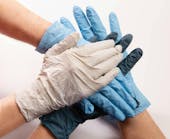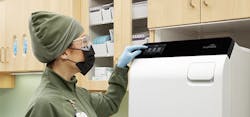Five ways to talk with your leadership about certification
This is part two of HIGH FIVE, a multi-part series on leading a successful and fulfilling sterile processing career.
Conscientious hospitals require their SPD technicians to acquire certification at an early point in their career. Certification through an established organization such as the International Association of Healthcare Central Service Materiel Management (IAHCSMM), or the Certification Board for Sterile Processing and Distribution (CBSPD) is important because it demonstrates a level of dedication from the technician, and proves an expertise that goes beyond the hands-on training that technicians receive on the job. Dedication and expertise are traits that patients expect throughout the entire spectrum of their care.
However, the examinations for these certifications are difficult, and impossible for most people to pass without study and practice. Over the last five years, the average success rate on the IAHCSMM CRCST exam is only 54 percent.1 Study of the materials provided by the certifying body is the deciding factor between success on the exam and having to try again. Study time is essential to a technician’s success in passing the exam, and should be granted at work, especially if it is a condition of employment.
So how can you talk to your department leadership about the need for study time at work? Here are five ways to approach your manager and supervisor about carving out time for study during your shift.
- Offer examples of why certification is important: The Association for the Advancement of Medical Instrumentation (AAMI) understands the importance of certification for sterile processing technicians. Point to their rationale, which states “Advances in surgical and information technology, the emergence of new diseases and microorganisms, and the increased responsibility for all aspects of sterile processing have brought into focus how important it is for sterile processing personnel to be knowledgeable and competent.”2 The protection of patients and everyone else who works in the hospital provides the focus to this rationale. AAMI’s recommendations are in place for the safety of patients, and this includes proper training and education for all workers involved in their care. In a healthcare facility, every person contributes to the safety of the patient, and everyone whose work touches a patient’s life should have the best training and education available. Sterilization techs often enter their profession with no education or experience, and this is why certification is especially important for them.
- Preach the gospel of study: The best way to prepare for a certification exam is to study the materials provided by the certifying organization. All of the questions on the exam are in the materials provided by the certifying body. Certifying organizations provide study guides that contain quizzes and practice exams. The questions in the quizzes and practice exams are the same questions on the real exam. No other source can claim to be representative of an actual certification exam. Let Leadership know that the best way to be successful on these tricky (46 percent failure rate) exams is to be familiar with the questions that will actually be on the exam. Taking the practice quizzes and tests provided in the study materials is the only reliable way to do this.Additionally, wording is important. Questions on the exams are challenging in part due to the word choice of the possible answers. The exam is looking for the best possible answer, and taking practice exams from the organization will familiarize the candidate with the language of the test, increasing their chance for success.
- Demonstrate the necessity of study during work time: While some facilities still do not require certification, and a few have gone backwards and lifted this crucial requirement, most hospitals today voluntarily require certification. Encouragingly, four states have made certification of sterilization technicians the law, which is great news for patients. If an uncertified technician is required to have a certification within a timeframe, such as 1 year or 18 months, as a condition of employment, opportunity for study during work time should be granted by the organization. Study time at work should be offered to the SPD employee, just as continuing education during work hours is provided for employees in other professions.
- Offer your supervisor alternative staffing ideas to assure yourself adequate time for exam preparation: In facilities that do not have an educator in the sterile processing department, staff can work with leadership to assure that there is time available to study for the certification exam. Technicians can suggest study time during low census days, trade duties with a fellow employee, or organize a lunchtime study group of candidates in the department. While department supervisors are rightfully concerned with the day’s production and quality of work, they also know that certification is important and probably remember taking their own certification exam. Communication between certification candidates and department leadership will assure successful outcomes for today’s patients and the technician’s future.
- Suggest to management or upper administration the idea of having an educator in your department: Technicians who have a strong advocate for certification working for them in their department have a greatly improved chance of successfully completing a certification test. Educators serve on the management team and are the technician’s mouthpiece with department leadership and hospital administration. An educator understands the importance of study for a certification exam and will advocate for technicians seeking certification. If your department is reluctant to hire a dedicated educator, there might be an educator in another department who would be willing to act in that role for the SPD. Most departments of the hospital have nurse educators working with the staff there. A good first choice is to seek out the OR educator and inquire if that person would be willing to work with SPD staff in professional development. Delores O’Connell, LPN, BA, CRCST, CIS, CHL, CSPDT, Clinical Education Specialist for Steris Corporation, notes that most larger hospitals in her Northwestern United States territory have some type of educator, “either a dedicated SPD educator or a shared perioperative educator for OR, SPD and sometimes Endo.” Providing quality education for the sterile processing department benefits the entire hospital, so an ally in education makes sense if the department does not have an educator of its own.
Sterile processing technicians are an important part of the care continuum. The professionals who clean and sterilize the instruments used in procedures should be expected to have the best training and education possible for them to contribute to the best outcome for every patient. With good communication and a well-supported, factual foundation, you can have a constructive conversation with your department leadership and gain the time you need to successfully pass your certification examination.
References:
- https://www.iahcsmm.org/certification/policies-reports-and-statistics.html
- ST79, Comprehensive guide to steam sterilization and sterility assurance in health care facilities, AAMI, 2013.


